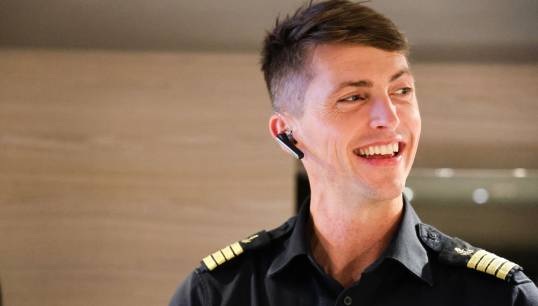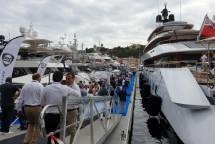- Topics
- Campaigning
- Careers
- Colleges
- Community
- Education and training
- Environment
- Equality
- Federation
- General secretary message
- Government
- Health and safety
- History
- Industrial
- International
- Law
- Members at work
- Nautilus news
- Nautilus partnerships
- Netherlands
- Open days
- Opinion
- Organising
- Podcasts from Nautilus
- Sponsored content
- Switzerland
- Technology
- Ukraine
- United Kingdom
- Welfare

Nautilus member Captain Chris Durham is master onboard the 84m MY Savannah − the world's first hybrid motor yacht. He has navigated his way through 18 years in the yachting industry on a wide range of sailing vessels and innovative superyachts, while championing the welfare of his crew and embracing the industry's shift towards sustainable fuels. He describes his route to becoming a Master 3000 Yacht, and provides useful insights for seafarers considering the use of future fuels. Interview by Deborah McPherson
What attracted you to a career in maritime?
I fell into the industry quite by chance. After completing my A-levels in the UK, I visited an aunt and uncle in New Zealand where I found a job in a shipyard labouring for a marine paint company. It was a great introduction to the industry, albeit not the most glamorous one.
Tell us about some of the different yachts you have worked on
I have been fortunate enough to work on a wide variety of vessels, ranging from 15m multihull sailing vessels up to a 70m fast support vessel. I learned a huge amount in the two years I spent on the fast support vessel. We were tasked with supporting a larger yacht and came equipped with a commercial helipad and helicopter, a Triton submarine capable of reaching depths of over 1000m, as well as a dive suit and dive chamber, not to mention the hospital. It was a fascinating couple of years and we had a great team onboard. I joined Savannah seven years ago as chief officer, and three years ago was made captain.
Why is the Savannah so special?
Built in Holland by Feadship De Vries and launched in 2015, Savannah was the world's first hybrid yacht. She has an innovative design together with a unique propulsion and power management system that can achieve fuel savings of up to 30%. There are a number of different ways in which power can be created, namely from a battery bank, diesel generators, and a large, medium speed engine, and Savannah can also operate in five different modes compared to a conventional yacht.
Tell us about your experience using future fuels
Two years ago Savannah bunkered hydrotreated vegetable oil (HVO), a type of biofuel that can be burned in conventional diesel engines, with substantial reductions in emissions.
Prior to bunkering there is a fair amount of paperwork to do and you still need to dot all the i's and cross all the t's by considering price and availability and making sure that the HVO you are buying comes from a sustainable source, that it comes with a certificate, that you have approval from flag, class and engine manufacturers, and that you have talked it through thoroughly with your management company. In my experience, a greater awareness of HVO needs to be raised within the yachting industry.
What are your career highlights?
A captain is happiest when everything is going smoothly and nothing untoward is happening, which is why 2024 stands out for me as being one of the highlights.
I witnessed what we (the Savannah crew and I) achieved as a team in successfully executing the busiest year of the program to date; the crew's ability to maintain a high level of professional operations whilst cruising in challenging environments; and at the same time continuing to promote and embrace the special culture we have onboard.
What have been some of your biggest career challenges?
My first year as captain was definitely the biggest challenge, although it also felt like such a privilege. It is almost impossible to describe the weight of responsibility that sits on your shoulders as a captain.
Who has helped you the most in your career?
Without a doubt Captain Steve Powell is the person who has helped me most. I was employed by him as first mate on his 60ft Oyster sailing yacht on a trip around South America and Antarctica and he was the first leader I encountered who actually took the time to teach and guide me, as well as provide feedback.
What made you decide to join a union?
I joined seven years ago to have my sea service verified and soon realised that Nautilus offered a great deal more than this. I always encourage my crew members to join and plan to try the new digital Sea Service Record next time I need to renew my master's licence.
Tell us one thing that people may not know about you
I am a UK-registered paramedic as well as a sailor. I was inspired to train 14 years ago when as a deck hand I was the one who had to attend to a crew member involved in an extremely serious accident onboard, because of an underwhelming response to the situation from the chief officer and captain. Luckily the crew member recovered, but I wanted to ensure I was better trained.
Where do you think seafaring careers are heading in future?
There is no question that the new generation expects more from their careers. I have been fortunate enough to have worked on a yacht whose late owner placed huge importance on the human element, from the design of the crew areas onboard to the culture and life he wanted for the crew; we were all looked after incredibly well.
I think there needs to be far more in-depth leadership training for heads of departments and officers right across the yachting industry. The current training for officers and captains is no longer fit for purpose. In addition to this, a great deal more awareness needs to be raised amongst all crew members about harassment, bullying and mental health.
We must continue to modernise the maritime workplace, and keep up to date with current research and best practices in leadership, DEI and work/ rest hours. I sincerely hope regulations will continue to be introduced that place the wellbeing of all seafarers at the top of the priority list.
Despite what I have said above, I would still highly recommend a career at sea. It provides you with an incredible opportunity to travel as well as giving you a structured career that can take you in so many different directions. I went down the yacht route to become a master (which was more like an apprenticeship that involved taking modules during periods of leave), as opposed to the unlimited route, mainly because I wasn't aware until later what career options were available even though I grew up on the south coast of Devon.
There is no right or wrong way but overall, I think young people would do better investing in the unlimited route to gain more career options. There is more crossover now between the commercial and the yachting industries, and the Maritime & Coastguard Agency has started to accept yachting time on vessels of a certain size towards commercial unlimited tickets. Going forward, I would like to see more awareness raised in schools about the various maritime career options available.

Join Nautilus International!
Be part of the union for maritime professionals
Wherever you are, so are we
We are the voice of maritime professionals, at sea and ashore. We have a say on all the major issues affecting our members.
✓Certificate protection
✓Legal assistance
✓Dispute resolution

Nautilus yacht hub
Visit the Nautilus yacht hub and find out more about our professional yacht services: how we can help superyacht crew members with sea service verification, as well as non-payment of wages, repatriation, termination, bullying, harassment, criminalisation, and other issues.
Tags
